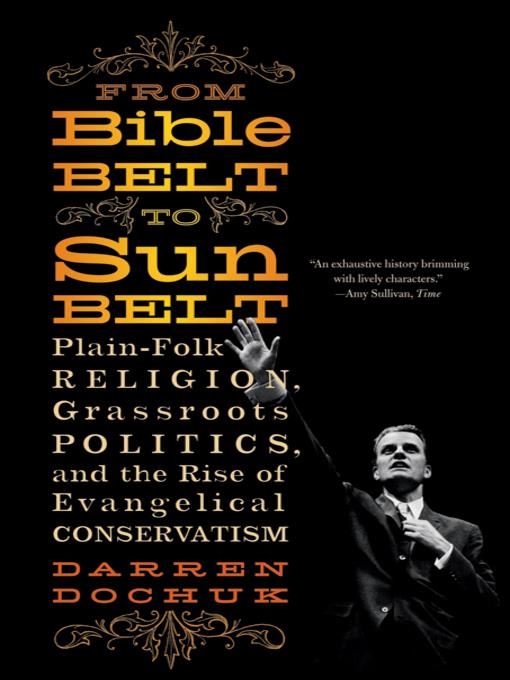
From Bible Belt to Sunbelt
Plain-Folk Religion, Grassroots Politics, and the Rise of Evangelical Conservatism
- اطلاعات
- نقد و بررسی
- دیدگاه کاربران
نقد و بررسی

November 29, 2010
Billy Graham reaches out on the cover, but the photo could just as well show George Pepperdine, E.V. Hill, Bill Bright—or any of scores of evangelicals and pentecostals profiled in Dochuk's well-wrought history of religion and politics. Poor workers from the Deep South immigrated to California in the 1930s for jobs; and, Dochuk argues, the "plain folk, preachers and entrepreneurs" packed their politics with their Bibles, intent on electing one of their own as president. They succeeded in 1980 with favorite son Ronald Reagan. For the cause, they pastored churches, parachurch organizations (Campus Crusade for Christ), businesses, and schools (Pepperdine University); they fought first Communists, then homosexuals; converted from being social justice Democrats to conservative, prosperity-gospel Republicans; diluted their racism; and learned to cooperate with each other's conventions. Dochuk, a professor at Purdue, conducted interviews and researched diligently through newsletters, newspapers, minutes of church and civic meetings, and the leaders' own letters, sermons, and memoirs. His convincing conclusions expose the foundations of today's evangelical conservatism; his writing is admirably clear and objective. (Dec. 13).

Starred review from November 1, 2010
A lucid history of how California, land of fruits and nuts and be-here-nowness, became a bastion of fundamentalist reaction. The manuscript won the 2006 Allan Nevins Prize from the Society of American Historians.
Blame it on the Arkansas-Texas-Oklahoma borderlands, a region that, writes Dochuk (History/Purdue Univ.), "produced a distinctive hybrid culture that combined the steely persistence and principles of the South with the rugged impatience and pragmatism of the West." This backwater might have remained so were it not for the upheaval of the Depression, when it tilted sideways and poured its population into Southern California. So thorough was the transformation that by 1969 and the ascendancy of Ronald Reagan, California had more Southerners in its population than did Arkansas. This "hybrid culture" valued preachers over political leaders and kept a clannish distance from its neighbors. With the rise of crusading evangelicals, Billy Graham being just one example, transplanted Californians took their values and votes into the streets, establishing such bastions of conservatism as Pepperdine University and, well, Knott's Berry Farm, and putting into law such legislation as Prop 13. Dochuk is a careful explainer of odd historical events, though his historian's objectivity allows a few subtleties to slip by that he might have pounced on—not least how the Bible Belt rhetoric of California circa 1966 is the rhetoric of the entire nation in 2010, with its immigrant-bashing, thinly disguised segregationism and disregard for the constitutional principle of the separation of church and state. Yet the author takes pains to chart how California's activist fundamentalism, once scorned by none other than Jerry Falwell, spread across the country, turning the whole place into an Ozark backwater, with music by Pat Boone.
Well-written and -documented, a supremely helpful guide in sorting out how we arrived at that odd state of affairs.
(COPYRIGHT (2010) KIRKUS REVIEWS/NIELSEN BUSINESS MEDIA, INC. ALL RIGHTS RESERVED.)

December 1, 2010
Most of the poor whites who left the South during the Depression and moved to California were Baptists. They became the bedrock for a new "Sunbelt" influence on American political culture. For Dochuk (history, Purdue Univ.), the key transition for this population of "Christ against Culture" white Protestants was a change in their self-identity, in which a pessimistic Old Testament narrative of exile was replaced by an optimistic quasi-Pauline sense of "errand" into the secular culture. These men and women proposed to bless an American society that they viewed as endangered by state collectivism and secularism. The result has been the "meld[ing] of traditionalism into an uncentered, unbounded religious culture of entrepreneurialism, experimentation, and engagement," whose high point for the participants was the presidency of Ronald Reagan. (The irony that Nancy Reagan used biblically forbidden astrology to set the President's daily schedule is not lost on Dochuck.) Gradually, the original worldly pessimism of the Baptists was dissolved in favor of "the more therapeutic and technological requisites of "Jesus, California style." VERDICT A colorful, intriguing, yet academic study of an important though little-researched process, this work is strongly recommended for students of American religion and politics.--Lisa Richmond, Wheaton Coll. Lib., IL
Copyright 2010 Library Journal, LLC Used with permission.




دیدگاه کاربران